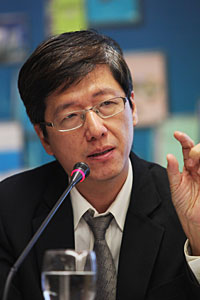
While changes in the criteria determining who is eligible for the old-age allowance by the outgoing Prayut Chan-o-cha government caused a stir, the issue of a low birth rate -- another important aspect of Thailand's aged society -- has not been discussed much.
The issue only gained short-lived public attention as Public Health Minister Dr Cholnan Srikaew declared increasing the fertility rate to be a national agenda. The minister drew criticism for blaming the decision of numerous couples who do not want to have children as "perverted".
One opposition MP saw it in a different light, saying there's nothing wrong with such a decision, and it's the individual couple's business whether to have children or not.
I think we need a serious talk about why married couples want to have fewer children, and some wish to remain childless. This article aims to propose a policy recommendation, after explaining the causes of the low appetite for having kids, without judging those couples -- whether they want to become a parent or not.
The fact is we saw only 500,000 births last year -- the lowest in 71 years -- in Thailand. It's the second year in a row the birth rate was lower than the mortality rate. If such a trend is maintained, the population of 70 million will be halved within the next few decades.
The low fertility rate has been a phenomenon for quite some time since many modern-day couples have decided to have fewer kids or none at all. There are numerous reasons for such a decision.
To begin with, a number of married couples are of the view that having kids is a burden, especially if they picture their would-be-kids raised to a standard much higher than when their parents raised them. The parents-to-be nowadays have high standards regarding their kids' education, such as studying in expensive private or international schools, having superb jobs, and enjoying a comfortable lifestyle. Therefore, some couples who are not sure if they can raise their kids in accordance with such a high standard choose to stay childless.
Besides, people in the old days had kids in the hope that their children would take care of them when they got old. Such expectations have faded as couples at the middle-income level and above now have confidence they will be able to take care of themselves in their advanced age. Some state policies like the universal healthcare scheme and others reinforce the idea that they will not require healthcare from their offspring. For non-health services, some believe they have sufficient savings for retirement without having to depend on their children financially.
Some couples love freedom and a highly independent lifestyle like travelling, as well as trying new things like switching jobs. If they have kids, they cannot have such options, or must take precautions.
Lastly, the poor perception of the present and future society makes some couples drop the idea of having kids. They don't want their children to grow up in rough social surroundings, an unhealthy environment, or amid bad politics. While such factors are only casually mentioned, some people do make it the reason for opting out of being a parent.
The low birth rate will affect the country's economic development in several ways.
The country will have a smaller labour force to chase healthy growth in GDP. Without the proper policy in place, the Thai economy will see slower growth. The 5-7% rate enjoyed two decades ago has already fallen to 3-4% in recent years. In the future, our GDP may plunge below 2% unless the productivity of the average worker increases significantly. If we fail, such poor productivity will deal a heavy blow, not only to the economy but also to society, worsening inequality and other problems.
According to statistics, a large number of babies are born to families that have insufficient resources to raise them to their full potential. It was found that 57% of children under 15 years are with families belonging to the so-called "bottom 40%" group (the families with the lowest income up to 40% of the total population). Needless to say, some of these children could have very high potential and could be the main force in taking care of their families, and also contribute a great deal to the country's development. When these children lose an opportunity, society also loses. There is an academic term, "Lost Einstein", to describe these poor children. I believe we have had a great loss over the past several decades with these would-be-Einsteins having no chance to develop.
With a diminishing and lower-quality labour force, it is very likely more firms will turn to automated equipment, robots, and AI to replace the lost labour. If that is the case, disparities will be intensified as workers who are at risk of dismissal and their children are set to lose an opportunity. A small number of capitalists will become richer, causing the inequality to heighten.
Another impact of declining workers is less tax revenue for the government, which has already been on a serious downward trend in recent decades. This will affect the budget for human capital development. The result is a vicious cycle of low economic growth, higher inequality, limited human capital investment and then back to low economic growth.
Obviously, the country needs proactive policies to steer away from this vicious cycle. The most effective policy is child development, from birth to working age. This must be a national agenda, with every sector, ranging from the government and business to civil society, getting involved. The main aim is to highlight the development of children now and those who will be born in the future. With a very low birth rate, there is no other policy more suitable to the concept of "leave no one behind" than a comprehensive child development policy; that is to say, not a single child should be left behind when it comes to human capital development.
For example, the government should make the child support grant policy, currently targeting only children from poor families and suffering from a 30% "exclusion error" (30% of poor kids don't get the grant), universal. Next, child development centres must be made available everywhere and the quality of care upgraded such that all children at the centres receive the proper development stimulus. Another interesting, outside-the-box policy is to give training to grandparents in "skipped-generation families" (families where the parents of small kids are absent) on how to raise their grandchildren properly.
Another outside-the-box policy is to consider giving permanent residency or nationality to children of migrant workers to address the fact that fewer Thai couples want to have kids, resulting in a population decline. Some countries have put in place such a policy and benefited greatly. For example, the United States is said to have been built by migrants and continues to benefit from new immigration. The Thai state may grant citizenship to migrant children who are assimilated into Thai society from a young age. Having grown up in Thai society, most of the migrant children feel they are Thai, having been disconnected from their parents' origins, and learning the Thai language and culture. If we have a development plan for them, as if they were our children, they will grow up and become a major force for the country's development. That will ease the impact of the super-aged society the country is facing.
On the other end, several countries have rolled out measures to encourage married couples to have kids. Singapore, for instance, provides a cash subsidy as an incentive. Some countries offer extended maternity leave, while others allow paternity leave as well, so families have flexibility in child care. The South Korean government has measures to control house prices because high prices were found to be one of the major factors making couples reluctant to start a family with kids. These policies may have limited outcomes, but they are worth considering.
Last but not least, we must help create a decent and liveable society for our kids. We need a society with equality, democracy and respect for one another, as this may change the minds of some reluctant couples.
Somchai Jitsuchon, PhD, is a research director (inclusive development) at the Thailand Development Research Institute (TDRI). Policy analyses from the TDRI appear in the Bangkok Post on alternate Wednesdays.
